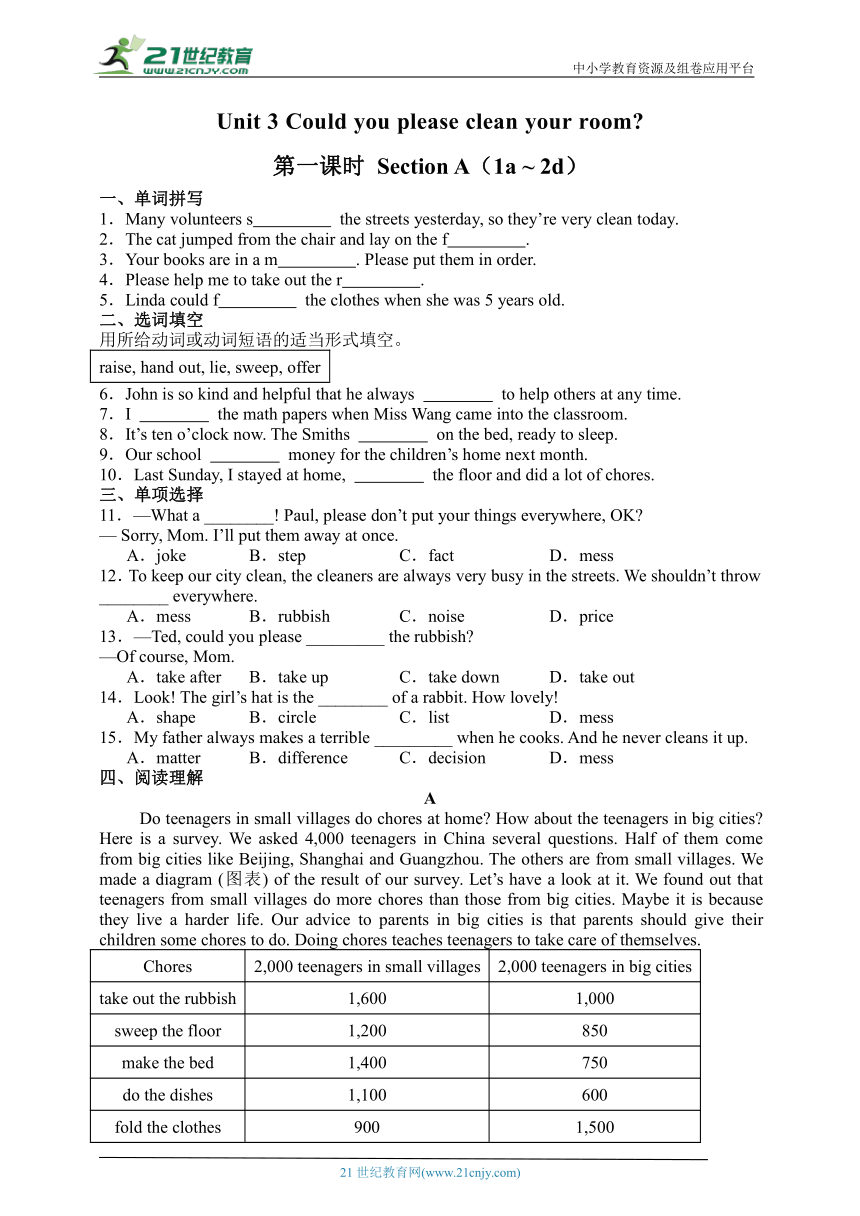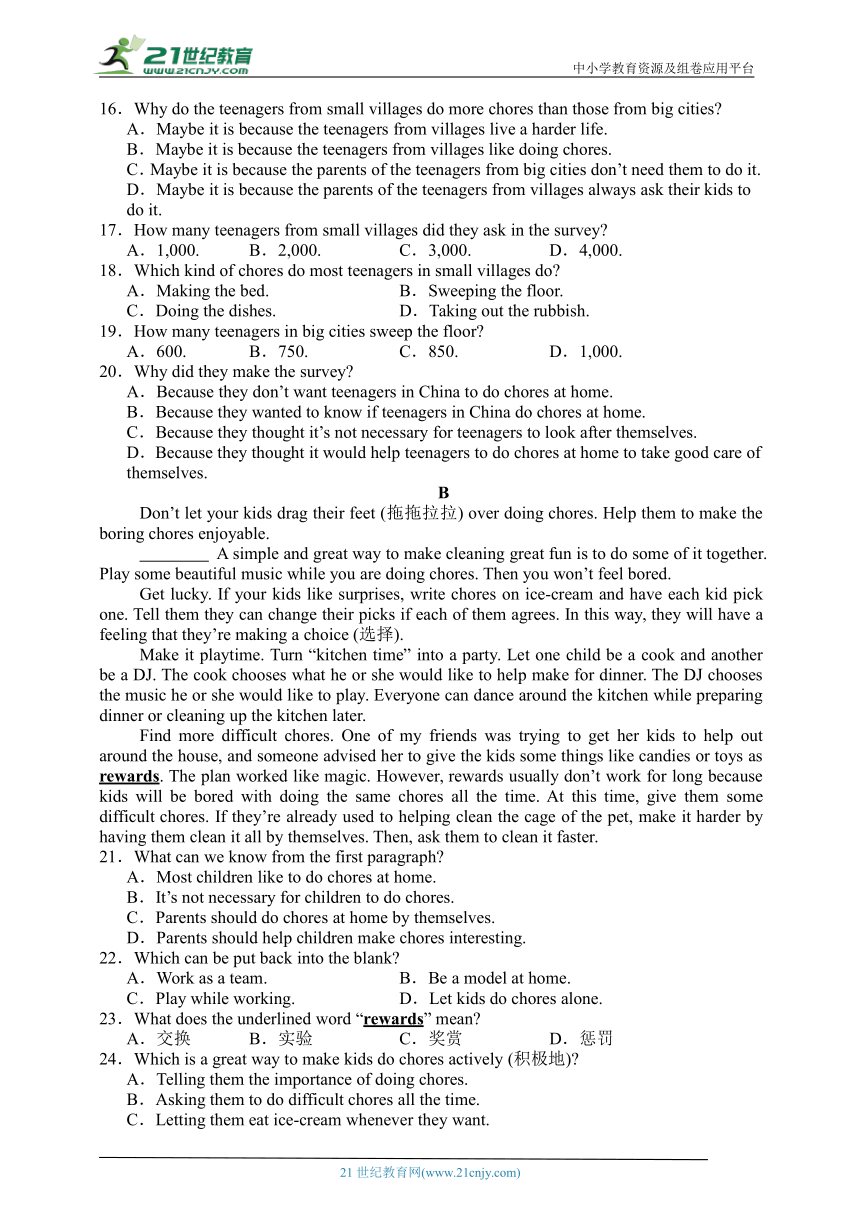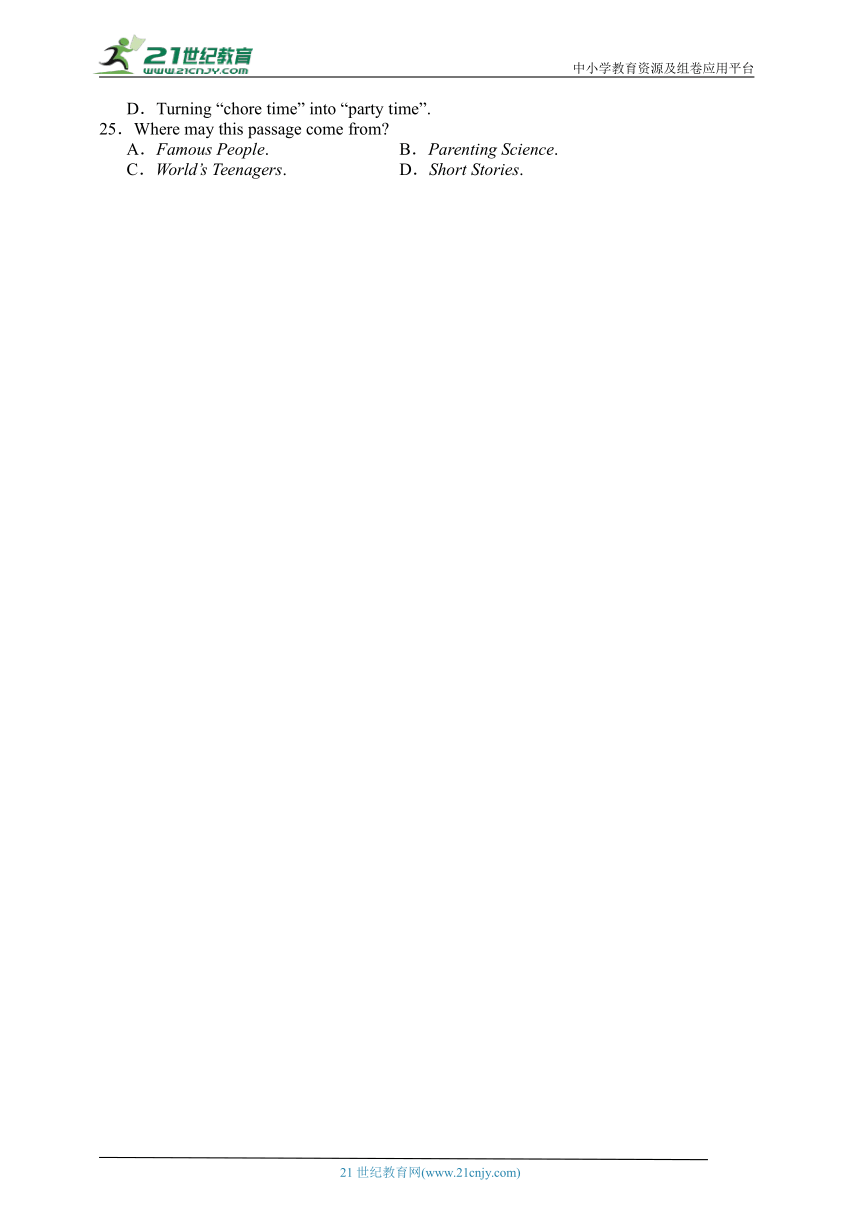Unit 3 Could you please clean your room第一课时Section A(1a ~ 2d)课时训练-2025人教版英语八年级下册
文档属性
| 名称 | Unit 3 Could you please clean your room第一课时Section A(1a ~ 2d)课时训练-2025人教版英语八年级下册 |

|
|
| 格式 | doc | ||
| 文件大小 | 285.6KB | ||
| 资源类型 | 试卷 | ||
| 版本资源 | 人教新目标(Go for it)版 | ||
| 科目 | 英语 | ||
| 更新时间 | 2025-03-03 00:00:00 | ||
图片预览



文档简介
中小学教育资源及组卷应用平台
Unit 3 Could you please clean your room
Section A(1a ~ 2d)
一、单词拼写
1.Many volunteers s the streets yesterday, so they’re very clean today.
2.The cat jumped from the chair and lay on the f .
3.Your books are in a m . Please put them in order.
4.Please help me to take out the r .
5.Linda could f the clothes when she was 5 years old.
二、选词填空
用所给动词或动词短语的适当形式填空。
raise, hand out, lie, sweep, offer
6.John is so kind and helpful that he always to help others at any time.
7.I the math papers when Miss Wang came into the classroom.
8.It’s ten o’clock now. The Smiths on the bed, ready to sleep.
9.Our school money for the children’s home next month.
10.Last Sunday, I stayed at home, the floor and did a lot of chores.
三、单项选择
11.—What a ________! Paul, please don’t put your things everywhere, OK
— Sorry, Mom. I’ll put them away at once.
A.joke B.step C.fact D.mess
12.To keep our city clean, the cleaners are always very busy in the streets. We shouldn’t throw ________ everywhere.
A.mess B.rubbish C.noise D.price
13.—Ted, could you please _________ the rubbish
—Of course, Mom.
A.take after B.take up C.take down D.take out
14.Look! The girl’s hat is the ________ of a rabbit. How lovely!
A.shape B.circle C.list D.mess
15.My father always makes a terrible _________ when he cooks. And he never cleans it up.
A.matter B.difference C.decision D.mess
四、阅读理解
A
Do teenagers in small villages do chores at home How about the teenagers in big cities Here is a survey. We asked 4,000 teenagers in China several questions. Half of them come from big cities like Beijing, Shanghai and Guangzhou. The others are from small villages. We made a diagram (图表) of the result of our survey. Let’s have a look at it. We found out that teenagers from small villages do more chores than those from big cities. Maybe it is because they live a harder life. Our advice to parents in big cities is that parents should give their children some chores to do. Doing chores teaches teenagers to take care of themselves.
Chores 2,000 teenagers in small villages 2,000 teenagers in big cities
take out the rubbish 1,600 1,000
sweep the floor 1,200 850
make the bed 1,400 750
do the dishes 1,100 600
fold the clothes 900 1,500
16.Why do the teenagers from small villages do more chores than those from big cities
A.Maybe it is because the teenagers from villages live a harder life.
B.Maybe it is because the teenagers from villages like doing chores.
C.Maybe it is because the parents of the teenagers from big cities don’t need them to do it.
D.Maybe it is because the parents of the teenagers from villages always ask their kids to do it.
17.How many teenagers from small villages did they ask in the survey
A.1,000. B.2,000. C.3,000. D.4,000.
18.Which kind of chores do most teenagers in small villages do
A.Making the bed. B.Sweeping the floor.
C.Doing the dishes. D.Taking out the rubbish.
19.How many teenagers in big cities sweep the floor
A.600. B.750. C.850. D.1,000.
20.Why did they make the survey
A.Because they don’t want teenagers in China to do chores at home.
B.Because they wanted to know if teenagers in China do chores at home.
C.Because they thought it’s not necessary for teenagers to look after themselves.
D.Because they thought it would help teenagers to do chores at home to take good care of themselves.
B
Don’t let your kids drag their feet (拖拖拉拉) over doing chores. Help them to make the boring chores enjoyable.
A simple and great way to make cleaning great fun is to do some of it together. Play some beautiful music while you are doing chores. Then you won’t feel bored.
Get lucky. If your kids like surprises, write chores on ice-cream and have each kid pick one. Tell them they can change their picks if each of them agrees. In this way, they will have a feeling that they’re making a choice (选择).
Make it playtime. Turn “kitchen time” into a party. Let one child be a cook and another be a DJ. The cook chooses what he or she would like to help make for dinner. The DJ chooses the music he or she would like to play. Everyone can dance around the kitchen while preparing dinner or cleaning up the kitchen later.
Find more difficult chores. One of my friends was trying to get her kids to help out around the house, and someone advised her to give the kids some things like candies or toys as rewards. The plan worked like magic. However, rewards usually don’t work for long because kids will be bored with doing the same chores all the time. At this time, give them some difficult chores. If they’re already used to helping clean the cage of the pet, make it harder by having them clean it all by themselves. Then, ask them to clean it faster.
21.What can we know from the first paragraph
A.Most children like to do chores at home.
B.It’s not necessary for children to do chores.
C.Parents should do chores at home by themselves.
D.Parents should help children make chores interesting.
22.Which can be put back into the blank
A.Work as a team. B.Be a model at home.
C.Play while working. D.Let kids do chores alone.
23.What does the underlined word “rewards” mean
A.交换 B.实验 C.奖赏 D.惩罚
24.Which is a great way to make kids do chores actively (积极地)
A.Telling them the importance of doing chores.
B.Asking them to do difficult chores all the time.
C.Letting them eat ice-cream whenever they want.
D.Turning “chore time” into “party time”.
25.Where may this passage come from
A.Famous People. B.Parenting Science.
C.World’s Teenagers. D.Short Stories.
参考答案
题号 11 12 13 14 15 16 17 18 19 20
答案 D B D A D A B D C D
题号 21 22 23 24 25
答案 D A C D B
1.(s)wept
【详解】句意:昨天许多志愿者扫了街道,所以今天它们很干净。根据“so they’re very clean today.”可知,是指志愿者们打扫了街道,sweep“打扫”,根据“yesterday”可知,时态是一般过去时,动词用过去式swept。故填(s)wept。
2.(f)loor
【详解】句意:猫从椅子上跳下来,躺在地板上。根据“The cat jumped from the chair and lay on the”及首字母可知,是从椅子上跳下来,躺在地板上,floor“地板”。故填(f)loor。
3.(m)ess
【详解】句意:你的书乱七八糟的。请把它们整理好。根据“Please put them in order.”及首字母可知,提醒对方把书整理好,由此可知书放得乱七八糟的,in a mess“一团糟”。故填(m)ess。
4.(r)ubbish
【详解】句意:请帮我把垃圾拿出去。根据“Please help me to take out the”及首字母可知,是把垃圾拿出去,rubbish“垃圾”,不可数名词。故填(r)ubbish。
5.(f)old
【详解】句意:琳达5岁的时候会叠衣服。根据“f...the clothes”可知,应表达会叠衣服,fold“折叠”,情态动词could后面加动词原形。故填(f)old。
6.offers 7.was handing out 8.are lying 9.will raise/is going to raise 10.swept
【解析】6.句意:约翰是如此善良和乐于助人,他总是主动提出在任何时候帮助别人。此空应填谓语动词,结合选词可知,此处是指约翰总是主动帮助别人,offer to do sth“主动提议做某事”,句子是一般现在时,主语是第三人称单数,动词用三单形式。故填offers。
7.句意:当王老师走进教室时,我正在发数学试卷。根据“I...the math papers when Miss Wang came into the classroom.”结合选词可知是指在发数学试卷。hand out“分发”。结合“when”以及语境可知,当王老师走进教室的时候,我我正在发数学试卷。应用过去进行时,主语是I,be动词用was。故填was handing out。
8.句意:现在是10点钟。史密斯一家人正躺在床上准备睡觉。根据“The Smiths...on the bed, ready to sleep.”可知是躺在床上。lie“躺”,动词。根据“It’s ten o’clock now. ”可知此句应用现在进行时,主语是复数,be动词用are。故填are lying。
9.句意:我们学校下个月将为儿童之家筹款。根据“Our school...money for the children’s home”可知是指筹集钱。raise“筹集”,动词。根据“next month”可知应用一般将来时will/be going to+动词原形。主语是单数,be动词用is。故填will raise/is going to raise。
10.句意:上周日,我待在家里,扫地,做了很多家务。根据“I stayed at home...the floor and did a lot of chores.”可知此处是关于家务,结合选词可知sweep“扫地”符合语境。句子是一般过去时,动词用过去式。故填swept。
11.D
【详解】句意:——真是一团糟!保罗,请不要把你的东西到处乱放,好吗?——对不起,妈妈。我马上把它们收起来。
考查名词辨析。joke玩笑;step步骤;fact事实;mess肮脏,杂乱。根据“Paul, please don’t put your things everywhere, OK ”可知,东西被乱摆乱放,说明房间一团糟。故选D。
12.B
【详解】句意:为了保持我们城市整洁,清洁工总是在街上忙碌,我们不应该随处扔垃圾。
考查名词辨析。mess脏乱;rubbish垃圾;noise噪音;price价格。根据“To keep our city clean...throw....everywhere.”可知,提到城市卫生和清洁工,且空处前动词为“throw”,空处填rubbish“垃圾”符合语境。故填rubbish。
13.D
【详解】句意:——泰德,你能把垃圾拿出去吗?——当然,妈妈。
考查动词短语。take after长得像;take up开始从事;take down取下;take out拿出去。根据“could you please ... the rubbish”可知,是把垃圾拿出去。故选D。
14.A
【详解】句意:看!这个女孩的帽子是兔子的形状。多么可爱!
考查名词辨析。shape形状;circle圆;list列表;mess杂乱。根据“the … of a rabbit”可知,此处应表示是兔子的形状。故选A。
15.D
【详解】句意:我父亲做饭时总是弄得一团糟。而且他从来不清理。
考查名词辨析。matter问题;difference差异;decision决定;mess混乱。根据“And he never cleans it up.”可知,他从来不清理干净,可知是弄得一团糟。故选D。
16.A 17.B 18.D 19.C 20.D
【导语】本文介绍了一项关于中国青少年在家务劳动方面表现的调查结果,发现来自小村庄的青少年比来自大城市的青少年做更多家务,并建议大城市的家长应该让孩子参与家务劳动,以培养他们的自理能力。
16.细节理解题。根据“We found out that teenagers from small villages do more chores than those from big cities. Maybe it is because they live a harder life.”可知,调查发现,来自小村庄的青少年比来自大城市的青少年做更多的家务。也许是因为他们的生活更艰难。故选A。
17.细节理解题。根据“2,000 teenagers in small villages”可知,有2000名来自小村庄的青少年参加了此次调查。故选B。
18.细节理解题。分析表格可知,小村庄里的大多数青少年都倒垃圾。故选D。
19.细节理解题。分析表格可知,大城市的青少年有850人扫地。故选C。
20.细节理解题。根据“Our advice to parents in big cities is that parents should give their children some chores to do. Doing chores teaches teenagers to take care of themselves.”可知,给大城市父母的建议是,父母应该给孩子做一些家务。做家务可以教会青少年照顾好自己。因此做这项调查的原因是他们认为这会帮助青少年在家里做家务,照顾好自己。故选D。
21.D 22.A 23.C 24.D 25.B
【分析】文章主要讲了如何帮孩子们把做家务变得有趣。
21.细节理解题。根据“Help them to make the boring chores enjoyable.”可知第一段告诉我们父母应该帮助孩子把家务变得有趣。故选D。
22.推理判断题。根据“A simple and great way to make cleaning great fun is to do some of it together. ”可知这里主要讲大家一起做家务,空格处填“Work as a team.”。故选A。
23.词义猜测题。根据“One of my friends was trying to get her kids to help out around the house, and someone advised her to give the kids some things like candies or toys as rewards.”可知此处指孩子们做家务了会给糖果或玩具,这应是作为奖励,rewards意为“奖赏”。故选C。
24.细节理解题。根据“Make it playtime. Turn ‘kitchen time’ into a party.”可知让孩子积极做家务的好方法是把家务时间变成派对时间。故选D。
25.推理判断题。文章主要讲了如何帮孩子们把做家务变得有趣,故选B。
21世纪教育网 www.21cnjy.com 精品试卷·第 2 页 (共 2 页)
21世纪教育网(www.21cnjy.com)
Unit 3 Could you please clean your room
Section A(1a ~ 2d)
一、单词拼写
1.Many volunteers s the streets yesterday, so they’re very clean today.
2.The cat jumped from the chair and lay on the f .
3.Your books are in a m . Please put them in order.
4.Please help me to take out the r .
5.Linda could f the clothes when she was 5 years old.
二、选词填空
用所给动词或动词短语的适当形式填空。
raise, hand out, lie, sweep, offer
6.John is so kind and helpful that he always to help others at any time.
7.I the math papers when Miss Wang came into the classroom.
8.It’s ten o’clock now. The Smiths on the bed, ready to sleep.
9.Our school money for the children’s home next month.
10.Last Sunday, I stayed at home, the floor and did a lot of chores.
三、单项选择
11.—What a ________! Paul, please don’t put your things everywhere, OK
— Sorry, Mom. I’ll put them away at once.
A.joke B.step C.fact D.mess
12.To keep our city clean, the cleaners are always very busy in the streets. We shouldn’t throw ________ everywhere.
A.mess B.rubbish C.noise D.price
13.—Ted, could you please _________ the rubbish
—Of course, Mom.
A.take after B.take up C.take down D.take out
14.Look! The girl’s hat is the ________ of a rabbit. How lovely!
A.shape B.circle C.list D.mess
15.My father always makes a terrible _________ when he cooks. And he never cleans it up.
A.matter B.difference C.decision D.mess
四、阅读理解
A
Do teenagers in small villages do chores at home How about the teenagers in big cities Here is a survey. We asked 4,000 teenagers in China several questions. Half of them come from big cities like Beijing, Shanghai and Guangzhou. The others are from small villages. We made a diagram (图表) of the result of our survey. Let’s have a look at it. We found out that teenagers from small villages do more chores than those from big cities. Maybe it is because they live a harder life. Our advice to parents in big cities is that parents should give their children some chores to do. Doing chores teaches teenagers to take care of themselves.
Chores 2,000 teenagers in small villages 2,000 teenagers in big cities
take out the rubbish 1,600 1,000
sweep the floor 1,200 850
make the bed 1,400 750
do the dishes 1,100 600
fold the clothes 900 1,500
16.Why do the teenagers from small villages do more chores than those from big cities
A.Maybe it is because the teenagers from villages live a harder life.
B.Maybe it is because the teenagers from villages like doing chores.
C.Maybe it is because the parents of the teenagers from big cities don’t need them to do it.
D.Maybe it is because the parents of the teenagers from villages always ask their kids to do it.
17.How many teenagers from small villages did they ask in the survey
A.1,000. B.2,000. C.3,000. D.4,000.
18.Which kind of chores do most teenagers in small villages do
A.Making the bed. B.Sweeping the floor.
C.Doing the dishes. D.Taking out the rubbish.
19.How many teenagers in big cities sweep the floor
A.600. B.750. C.850. D.1,000.
20.Why did they make the survey
A.Because they don’t want teenagers in China to do chores at home.
B.Because they wanted to know if teenagers in China do chores at home.
C.Because they thought it’s not necessary for teenagers to look after themselves.
D.Because they thought it would help teenagers to do chores at home to take good care of themselves.
B
Don’t let your kids drag their feet (拖拖拉拉) over doing chores. Help them to make the boring chores enjoyable.
A simple and great way to make cleaning great fun is to do some of it together. Play some beautiful music while you are doing chores. Then you won’t feel bored.
Get lucky. If your kids like surprises, write chores on ice-cream and have each kid pick one. Tell them they can change their picks if each of them agrees. In this way, they will have a feeling that they’re making a choice (选择).
Make it playtime. Turn “kitchen time” into a party. Let one child be a cook and another be a DJ. The cook chooses what he or she would like to help make for dinner. The DJ chooses the music he or she would like to play. Everyone can dance around the kitchen while preparing dinner or cleaning up the kitchen later.
Find more difficult chores. One of my friends was trying to get her kids to help out around the house, and someone advised her to give the kids some things like candies or toys as rewards. The plan worked like magic. However, rewards usually don’t work for long because kids will be bored with doing the same chores all the time. At this time, give them some difficult chores. If they’re already used to helping clean the cage of the pet, make it harder by having them clean it all by themselves. Then, ask them to clean it faster.
21.What can we know from the first paragraph
A.Most children like to do chores at home.
B.It’s not necessary for children to do chores.
C.Parents should do chores at home by themselves.
D.Parents should help children make chores interesting.
22.Which can be put back into the blank
A.Work as a team. B.Be a model at home.
C.Play while working. D.Let kids do chores alone.
23.What does the underlined word “rewards” mean
A.交换 B.实验 C.奖赏 D.惩罚
24.Which is a great way to make kids do chores actively (积极地)
A.Telling them the importance of doing chores.
B.Asking them to do difficult chores all the time.
C.Letting them eat ice-cream whenever they want.
D.Turning “chore time” into “party time”.
25.Where may this passage come from
A.Famous People. B.Parenting Science.
C.World’s Teenagers. D.Short Stories.
参考答案
题号 11 12 13 14 15 16 17 18 19 20
答案 D B D A D A B D C D
题号 21 22 23 24 25
答案 D A C D B
1.(s)wept
【详解】句意:昨天许多志愿者扫了街道,所以今天它们很干净。根据“so they’re very clean today.”可知,是指志愿者们打扫了街道,sweep“打扫”,根据“yesterday”可知,时态是一般过去时,动词用过去式swept。故填(s)wept。
2.(f)loor
【详解】句意:猫从椅子上跳下来,躺在地板上。根据“The cat jumped from the chair and lay on the”及首字母可知,是从椅子上跳下来,躺在地板上,floor“地板”。故填(f)loor。
3.(m)ess
【详解】句意:你的书乱七八糟的。请把它们整理好。根据“Please put them in order.”及首字母可知,提醒对方把书整理好,由此可知书放得乱七八糟的,in a mess“一团糟”。故填(m)ess。
4.(r)ubbish
【详解】句意:请帮我把垃圾拿出去。根据“Please help me to take out the”及首字母可知,是把垃圾拿出去,rubbish“垃圾”,不可数名词。故填(r)ubbish。
5.(f)old
【详解】句意:琳达5岁的时候会叠衣服。根据“f...the clothes”可知,应表达会叠衣服,fold“折叠”,情态动词could后面加动词原形。故填(f)old。
6.offers 7.was handing out 8.are lying 9.will raise/is going to raise 10.swept
【解析】6.句意:约翰是如此善良和乐于助人,他总是主动提出在任何时候帮助别人。此空应填谓语动词,结合选词可知,此处是指约翰总是主动帮助别人,offer to do sth“主动提议做某事”,句子是一般现在时,主语是第三人称单数,动词用三单形式。故填offers。
7.句意:当王老师走进教室时,我正在发数学试卷。根据“I...the math papers when Miss Wang came into the classroom.”结合选词可知是指在发数学试卷。hand out“分发”。结合“when”以及语境可知,当王老师走进教室的时候,我我正在发数学试卷。应用过去进行时,主语是I,be动词用was。故填was handing out。
8.句意:现在是10点钟。史密斯一家人正躺在床上准备睡觉。根据“The Smiths...on the bed, ready to sleep.”可知是躺在床上。lie“躺”,动词。根据“It’s ten o’clock now. ”可知此句应用现在进行时,主语是复数,be动词用are。故填are lying。
9.句意:我们学校下个月将为儿童之家筹款。根据“Our school...money for the children’s home”可知是指筹集钱。raise“筹集”,动词。根据“next month”可知应用一般将来时will/be going to+动词原形。主语是单数,be动词用is。故填will raise/is going to raise。
10.句意:上周日,我待在家里,扫地,做了很多家务。根据“I stayed at home...the floor and did a lot of chores.”可知此处是关于家务,结合选词可知sweep“扫地”符合语境。句子是一般过去时,动词用过去式。故填swept。
11.D
【详解】句意:——真是一团糟!保罗,请不要把你的东西到处乱放,好吗?——对不起,妈妈。我马上把它们收起来。
考查名词辨析。joke玩笑;step步骤;fact事实;mess肮脏,杂乱。根据“Paul, please don’t put your things everywhere, OK ”可知,东西被乱摆乱放,说明房间一团糟。故选D。
12.B
【详解】句意:为了保持我们城市整洁,清洁工总是在街上忙碌,我们不应该随处扔垃圾。
考查名词辨析。mess脏乱;rubbish垃圾;noise噪音;price价格。根据“To keep our city clean...throw....everywhere.”可知,提到城市卫生和清洁工,且空处前动词为“throw”,空处填rubbish“垃圾”符合语境。故填rubbish。
13.D
【详解】句意:——泰德,你能把垃圾拿出去吗?——当然,妈妈。
考查动词短语。take after长得像;take up开始从事;take down取下;take out拿出去。根据“could you please ... the rubbish”可知,是把垃圾拿出去。故选D。
14.A
【详解】句意:看!这个女孩的帽子是兔子的形状。多么可爱!
考查名词辨析。shape形状;circle圆;list列表;mess杂乱。根据“the … of a rabbit”可知,此处应表示是兔子的形状。故选A。
15.D
【详解】句意:我父亲做饭时总是弄得一团糟。而且他从来不清理。
考查名词辨析。matter问题;difference差异;decision决定;mess混乱。根据“And he never cleans it up.”可知,他从来不清理干净,可知是弄得一团糟。故选D。
16.A 17.B 18.D 19.C 20.D
【导语】本文介绍了一项关于中国青少年在家务劳动方面表现的调查结果,发现来自小村庄的青少年比来自大城市的青少年做更多家务,并建议大城市的家长应该让孩子参与家务劳动,以培养他们的自理能力。
16.细节理解题。根据“We found out that teenagers from small villages do more chores than those from big cities. Maybe it is because they live a harder life.”可知,调查发现,来自小村庄的青少年比来自大城市的青少年做更多的家务。也许是因为他们的生活更艰难。故选A。
17.细节理解题。根据“2,000 teenagers in small villages”可知,有2000名来自小村庄的青少年参加了此次调查。故选B。
18.细节理解题。分析表格可知,小村庄里的大多数青少年都倒垃圾。故选D。
19.细节理解题。分析表格可知,大城市的青少年有850人扫地。故选C。
20.细节理解题。根据“Our advice to parents in big cities is that parents should give their children some chores to do. Doing chores teaches teenagers to take care of themselves.”可知,给大城市父母的建议是,父母应该给孩子做一些家务。做家务可以教会青少年照顾好自己。因此做这项调查的原因是他们认为这会帮助青少年在家里做家务,照顾好自己。故选D。
21.D 22.A 23.C 24.D 25.B
【分析】文章主要讲了如何帮孩子们把做家务变得有趣。
21.细节理解题。根据“Help them to make the boring chores enjoyable.”可知第一段告诉我们父母应该帮助孩子把家务变得有趣。故选D。
22.推理判断题。根据“A simple and great way to make cleaning great fun is to do some of it together. ”可知这里主要讲大家一起做家务,空格处填“Work as a team.”。故选A。
23.词义猜测题。根据“One of my friends was trying to get her kids to help out around the house, and someone advised her to give the kids some things like candies or toys as rewards.”可知此处指孩子们做家务了会给糖果或玩具,这应是作为奖励,rewards意为“奖赏”。故选C。
24.细节理解题。根据“Make it playtime. Turn ‘kitchen time’ into a party.”可知让孩子积极做家务的好方法是把家务时间变成派对时间。故选D。
25.推理判断题。文章主要讲了如何帮孩子们把做家务变得有趣,故选B。
21世纪教育网 www.21cnjy.com 精品试卷·第 2 页 (共 2 页)
21世纪教育网(www.21cnjy.com)
同课章节目录
- Unit 1 What's the matter?
- Section A
- Section B
- Unit 2 I'll help to clean up the city parks.
- Section A
- Section B
- Unit 3 Could you please clean your room?
- Section A
- Section B
- Unit 4 Why don't you talk to your parents?
- Section A
- Section B
- Unit 5 What were you doing when the rainstorm came
- Section A
- Section B
- Review of Units 1-5
- Unit 6 An old man tried to move the mountains.
- Section A
- Section B
- Unit 7 What's the highest mountain in the world?
- Section A
- Section B
- Unit 8 Have you read Treasure Island yet?
- Section A
- Section B
- Unit 9 Have you ever been to a museum?
- Section A
- Section B
- Unit 10 I've had this bike for three years.
- Section A
- Section B
